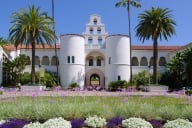You have /5 articles left.
Sign up for a free account or log in.
Officials at the University of Denver watched and listened with great interest Monday as the State Department announced that it was restoring full diplomatic relations with Libya and removing the North African country from the list of state sponsors of terrorism.
Two students from Libya are learning English at a campus-run language center at Denver this spring and are expected to enroll at the university upon completion of the six- to nine-month program. As many as 13 other Libyan students may enroll in the graduate school in the near future, said Rahmat Shoureshi, dean of the School of Engineering and Computer Science.
It was common for Libyans to study in the United States before the early 1980s, when diplomatic relations between the two countries soured after Libya was implicated in terrorist attacks, including the 1988 bombing of Pam Am Flight 103. Three years ago, Libya agreed to give up weapons of mass destruction and officially denounced terrorism. Last year, the United States ended a trade embargo against the country and lifted a ban on travel there by Americans.
Shoureshi received permission to meet with officials from Libya’s Ministry of Higher Education in January 2005. On the recruiting trip, he met with administrators from universities and potential students who he said were “eager” to enroll in American colleges.
“Many Libyans who studied in the United States decades earlier, their sons and daughters are reaching [college] age, and would like to have a U.S. education,” Shoureshi said. University of Denver officials were ready to accept the students. "Libya is not on our blacklist. We want their students here," Ved Nanda, the university's vice provost for internationalization, told The Denver Post.
Added Shoureshi: “If you look at the university, there’s a great deal of emphasis on internationalization and diversity. When I presented the idea of reaching out to Libyan students, there was a great deal of support from my colleagues, other deans and other administrators.”
The city of Denver has a population of about 300 Libyans, Shoureshi said he learned from examining local demographics before his trip. Some are successful business owners and have shown support for student matriculation at the university, he said. Last week, Libya’s Washington representative, Ali Aujali, visited the University of Denver, in part to talk about future plans for student attendance.
One of the Libyan students arrived at the university in April; the other came last Wednesday. Both have conditional enrollment into the engineering and computer sciences school upon passing the English course.
Shoureshi said the Libyan students were “excited” to hear Monday’s news. “This will hopefully facilitate more Libyans coming here, and it will make it easier for [our] students to visit Libya,” Shoureshi said.








